Note: There are scenes in this drama that portray heavy topics including physical and verbal violence, eating disorders, sexual assault, self-harm, and suicide. Although this review will not detail any of these portrayals, and a note will be included before any mention of these issues, readers are advised to proceed with care.
If you or anyone you know is experiencing distress, a list of helplines from around the world can be found here: https://findahelpline.com/i/iasp

Since hit fantasy drama Goblin aired in 2016, the figure of the grim reaper has become firmly lodged in the consciousness of many K-drama viewers. The reaper is stylishly dressed in black, always; slightly sleep-deprived, naturally; and more often than not, carries a harrowing past that has led them to an equally harrowing responsibility in the interim space between the living world and afterlife. Tomorrow is the latest fantasy drama centering on the difficult but important work of the grim reaper, with a twist. Here, reapers don’t claim lives; they save them. Despite its supernatural premise, the power that the drama explores lies in the deeply human qualities of words and emotions.
Through the eyes of Jun-woong (SF9‘s Rowoon), a human who unwittingly lands himself in a contract grim reaper position after an accident, we are acquainted with Jumadeung, a businesslike organisation bridging the land of the living with the underworld. Jumadeung is named after a traditional lantern that rotates and projects moving images, usually of a horse rider, onto a wall when lit. It alludes to the Korean saying of “life flashing past like a jumadeung”, a phenomenon that is often said to occur during a life-threatening incident or just before one’s death.
Indeed, an overworked Editing Team, tasked with making montages for the souls to be escorted to the afterlife, features on occasion in the earlier half of the show. But Tomorrow’s main action follows the relatively new, understaffed Risk Management Team, a project team established in hopes of combating the high suicide rates in Korea.
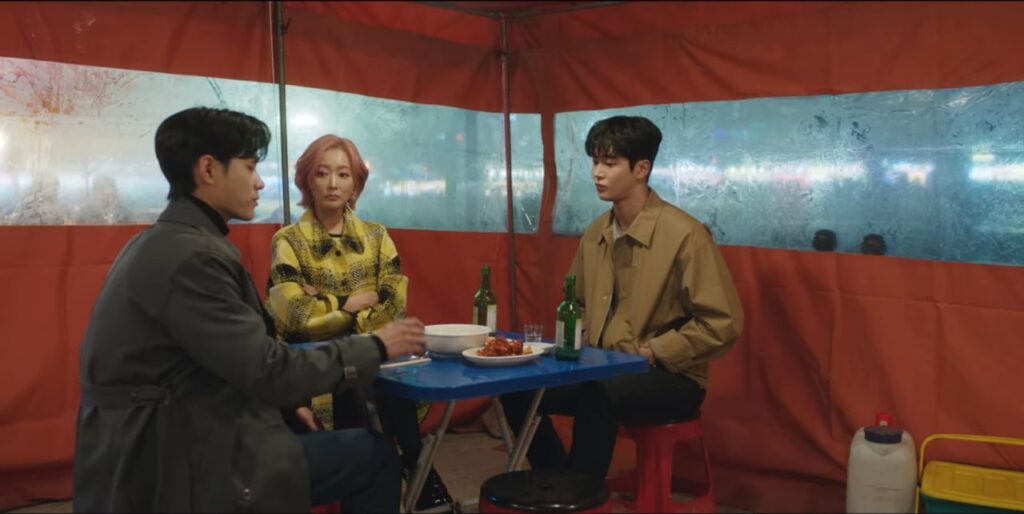
The Risk Management Team is led by experienced grim reaper Koo Ryeon (Kim Hee-seon, who puts in an outstanding performance), supported by fellow reaper Im Ryung-gu (Yoon Ji-on) and newbie Jun-woong. Together, they race to rescue people who are weighed down by their daily suffering and on the brink of taking their own lives. The process is gruelling and emotionally demanding, and Tomorrow pulls no punches in immersing the viewer in the despair of each character the team meets.
Note: This review does not contain major spoilers for the plot. It does, however, mention specific issues dealt with, and some resolutions to the episodic stories.
The Risk Management Team’s cases dive into just about every source of han—a deep-seated, collectively-experienced grief, caused by a sense of being deeply wronged—in Korean society. Some experiences are located in modern social problems: long-drawn and fruitless job searches, school and cyberbullying, and lookism—discrimination based on physical appearance. Other stories are even more historically and culturally specific: the plight of the impoverished elderly who dedicated their youths to protecting the peace and prosperity of modern-day Korea, survivors of being comfort women who still live without their suffering being properly acknowledged, and even further back into time, the shunned returning ladies of the 1636 Qing invasion of Joseon. Several characters struggle with more personal tragedies, like losing their families.
Note: The following three paragraphs contain brief mentions of eating disorders and sexual assault.
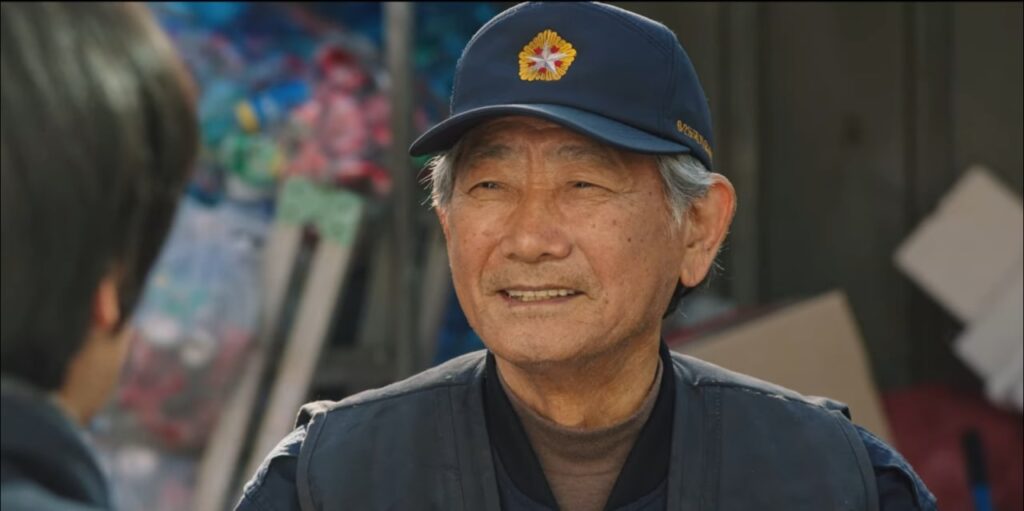
With such a variety of stories to portray, Tomorrow could have easily become disjointed, but it pulses with thematic purpose from start to end. A key message that the drama voices is the dichotomous power that words hold. Across different stories, we see that even the most careless words tossed out in passing can entrap the psyche of the listener. Musician Woo-jin (Winner‘s Kang Seungyoon), who loses his birth and adoptive families and later his wife, believes that he is at fault for their deaths because his father blamed him for his mother’s death when he was a child. Ye-na (Han Hae-in), a capable team leader in a beauty company, suffers from years of eating disorders caused by comments on her appearance that pivot from fat-shaming in her adolescence to criticising her present skinniness.
In the most heart-breaking instance of hurtful language, university student Yun-hee (Lee Ji-won) is met first with victim-blaming comments from those closest to her, rather than words of compassion, after a horrific sexual assault. Tomorrow reminds us that although words don’t take a tangible form, they can cause equal—if not more—anguish than actual acts of persecution.

Yun-hee’s episode is also the first in a series of stories that build up to a covert commentary on misogynistic beliefs that have persisted across time. Just as Yun-hee is berated for a crime that was committed against her—her family and the defense lawyer question her choice of clothing and decision to go out drinking with friends—so, too, do the comfort women and returning ladies, who survived the ordeal of being taken captive by foreign soldiers, meet with contempt upon their return. A woman’s value is tied to her chastity or fidelity, and she, rather than the perpetrator, is made to shoulder the responsibility of being violated. The utter emotional injustice of this twisted perspective is conveyed most clearly in the tragic pasts of Ryung-gu and Ryeon, which the drama dedicates full one-hour episodes to fleshing out.
At the same time, Tomorrow highlights the power of words to inspire strength and healing. When Jun-woong first joins Jumadeung, the Risk Management Team is struggling with a low success rate. In their haste to save people at risk of suicide, Ryung-gu and Ryeon often resort to inappropriate means: yelling (“Get yourself together!”), reverse psychology (as seen in the first case of Eun-bi [Jo In], a victim of school bullying), and even scaremongering (“Do you think the afterlife will be any better?”). It is not until Jun-woong comes in with a more compassionate approach that they realise what truly promotes healing: taking the time to properly understand and verbally acknowledge the hardships of the people they meet. The stern but kind Jade Emperor (Kim Hae-sook) notes sagely:
Team Leader Park Joong-gil said this to me. That he couldn’t understand why [people] choose death so easily if just a few words can bring the strength to live. So Ryeonie, you show him. That it is the weight of words, and not superpowers, that saves people.

The fallibility of the grim reapers adds depth to the stories of Tomorrow. Like the people they try to rescue, Ryung-gu and Ryeon have suffered crushing pain. They may have supernatural powers, but they remain deeply human, motivated by their regrets from their pasts and their hopes to save others from a similar fate. At times, their scars cause them to act impulsively and risk alienating those they rescue. But sometimes, it is the ability to draw from these vulnerable parts of themselves that helps them to find the right words for the despairing souls they meet, as seen in how Ryeon reaches out to Yun-hee and how Ryung-gu gets through to Yu-hwa (Min Jin-ah), a mother grieving for her lost baby. Even the seemingly apathetic Escort Team Leader Joong-gil (played with incredible nuance by Lee Soo-hyuk) has very human moments, such as when he covers the eyes of a little girl’s soul to save her from the trauma of seeing her wounded, unconscious mother.
Aside from the narrative hints scattered throughout the cases, the drama also makes excellent use of camerawork and lighting to cue the viewer into our reapers’ emotional scars. One scene that stands out for its cinematography is the conversation about fate and destiny between Ryeon and Jun-woong near the end of episode 5. Ryeon sits half-shrouded in the shadows of the Team’s run-down office; a single desk lamp creates a sense of emotional intimacy, almost like we are listening to a story next to a fireplace at night.
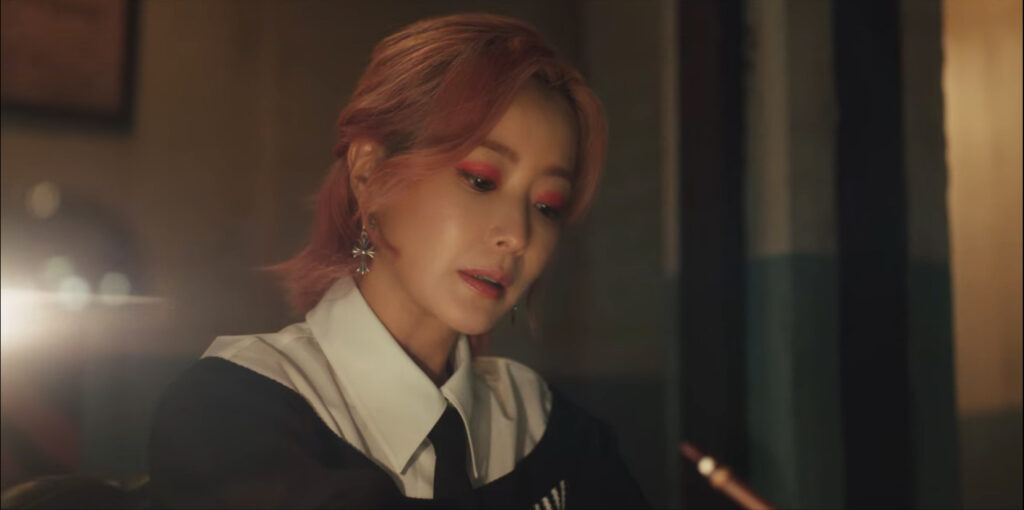
As Ryeon answers Jun-woong’s questions about fate, karma, and destiny, the camera cuts between shots of her calligraphy and her face. As her sharing moves from factual exposition to touch on rules of the afterlife that personally affected her, the close-ups allow us to see her retreat into her memories without using any flashbacks. It is an approach that works especially well with Kim Hee-seon’s controlled, powerful acting; through small details such as the set of her jaw, the furrow of her brow, or a tiny quiver in her voice, she poignantly conveys multitudes of Ryeon’s repressed emotions.
Despite its thematic coherence and artful cinematography, however, Tomorrow is not without obvious faults. While the drama creates space for empathy to develop for most of its characters, the portrayal of suicide broker Jin-ho (Min Jin-woong) shatters this pattern. The show fails to even hint at any factors that caused Jin-ho’s depravity to the extent of persuading emotionally vulnerable persons into committing mass suicide. His characterisation falls back on a familiar caricature: the conniving, psychopathic criminal. He is dehumanised and exploited as a convenient plot device to illustrate the laws of Tomorrow‘s universe: evil will be punished, both in the realm of the living and in the afterlife. Worse still, his punishment comes in the form of losing his sight and speech; one can hardly bear to think of what this implies about those who were born blind or with hearing impairments.

Another notable flaw lies in the way the suicide risk cases are resolved. The drama shows various contexts in which the decision to commit suicide arises. For some characters like Yu-hwa and Jun-woong’s friend Jae-soo (Ryu Sung-rok), it is an impulsive move in a moment of intense despair, but for others like Ye-na, it is an act that comes from more than a decade of physical and mental health struggles. No matter how apt Jun-woong’s words are to her, it is inconceivable that overnight, Ye-na can then properly stomach–and even enjoy–a slice of cake without first seeking professional help to restore her relationship with her body and with eating. Words of compassion could have transformed the characters’ perspectives, but the path to healing from deeply embedded emotional wounds consists of more than this initial mental shift, and requires more than personal willpower. This is something the show fails to acknowledge, even in passing.
In the context of the show’s purpose, such a misstep is somewhat understandable. Tomorrow is a fantasy in two senses of the word: a genre of imaginative fiction that involves magic, and the process of creating mental images (especially unrealistic or improbable ones) in response to a psychological need. It may portray a lot of despair and suffering, but its overarching tone is reassuring, and its universe operates with justice. A red thread reunites lovers parted too soon; messages written in the sand get delivered to babies lost in childbirth. A school bully gets a taste of her own medicine when she is sent into the memories of her victim; a misogynistic boss is cursed with irritable bowel syndrome whenever he utters a sexist remark. These are the endings we hope for, but cannot have in real life; seeing them on screen provides catharsis and relief from this painful truth.
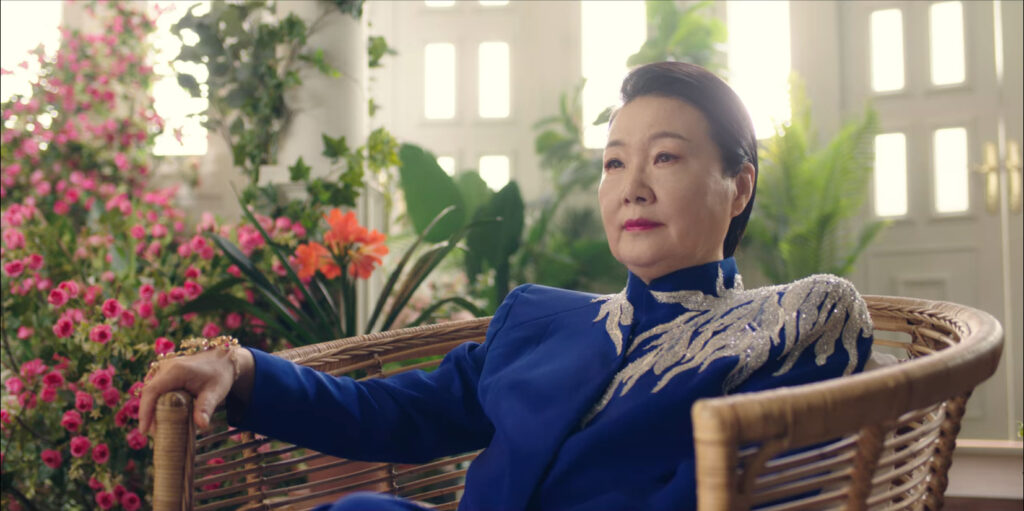
The balance between raising awareness for heavy issues through faithful portrayals and creating a sense of hope is admittedly difficult to achieve. I do not begrudge the characters their happy endings, but I do wish the same care to ensure realism in the hardships shown was applied to the resolutions of each story as well. Showing that the characters haven’t achieved complete healing on screen doesn’t undermine the fact that they are in a better place. It is an acknowledgement of the depth of their suffering, and a reminder that it is normal to take time to heal.
For all its imperfections, Tomorrow still remains compelling. From the comedic camaraderie of the Risk Management Team, to the emotive cinematography and beautifully written sageuk flashbacks, it is a story with a lot of merits. I would not say it is a must-watch, especially for viewers who may be sensitive to its rather explicit portrayals of heavy issues. However, if you’re in the mood for a fantasy with a lot of heart, this might prove to be a worthwhile watch.
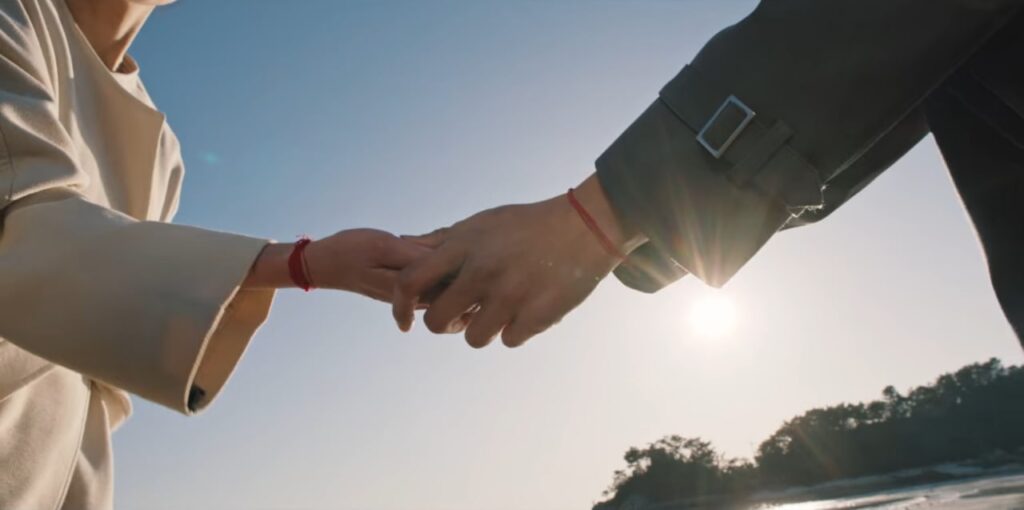
(YouTube, CNN, Merriam-Webster, The Korea Times, The Kraze Magazine. Images via MBC.)


